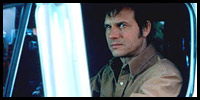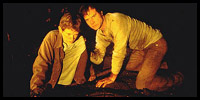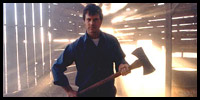
 |
Frailty (2002) Directed by Bill Paxton Cast: Bill Paxton, Matthew McConaughey, Matthew O'Leary, Jeremy Sumpter, Powers Boothe, Luke Askew, Melissa Crider 2002 – 100 minutes Rated: Reviewed by Dustin Putman, April 14, 2002.  The auspicious directorial debut of actor Bill Paxton (2000's "Vertical Limit"), "Frailty" bears a notable similarity to 1991's challenging "The Rapture." Both films portray a character who receives, or at least believes they have received, an important message from God, and go to extreme measures to obey His words. Whereas "The Rapture" was a stark drama, however, "Frailty" is an atmospherically grim horror picture that, for most of its running time, treats its subject with uncompromising maturity. While the final fifteen minutes fall apart based on a problematic and unnecessary plot twist, it cannot undo the startling opening eighty.
The auspicious directorial debut of actor Bill Paxton (2000's "Vertical Limit"), "Frailty" bears a notable similarity to 1991's challenging "The Rapture." Both films portray a character who receives, or at least believes they have received, an important message from God, and go to extreme measures to obey His words. Whereas "The Rapture" was a stark drama, however, "Frailty" is an atmospherically grim horror picture that, for most of its running time, treats its subject with uncompromising maturity. While the final fifteen minutes fall apart based on a problematic and unnecessary plot twist, it cannot undo the startling opening eighty.
 The film begins with a late-night visit to FBI agent Wesley Doyle's (Powers Boothe) office by Fenton Meiks (Matthew McConaughey), who claims that his younger brother, Adam, is the serial killer who has recently taken the lives of six people in the town. Through extensive flashbacks, he recounts the dark childhood secrets he has kept to himself since 1979. That was the year when his gentle widowed father (Bill Paxton) woke the young Fenton (Matthew O'Leary) and Adam (Jeremy Sumpter) up late one night and matter-of-factly told them that he was visited by God. His mission is to track down all of the demons of the world who are in human form and destroy them. While the impressionable Adam believes him, Fenton is instantly skeptical of his father's sanity, and then horrified beyond belief when he begins bringing people home with him and brutally slaughtering them.
The film begins with a late-night visit to FBI agent Wesley Doyle's (Powers Boothe) office by Fenton Meiks (Matthew McConaughey), who claims that his younger brother, Adam, is the serial killer who has recently taken the lives of six people in the town. Through extensive flashbacks, he recounts the dark childhood secrets he has kept to himself since 1979. That was the year when his gentle widowed father (Bill Paxton) woke the young Fenton (Matthew O'Leary) and Adam (Jeremy Sumpter) up late one night and matter-of-factly told them that he was visited by God. His mission is to track down all of the demons of the world who are in human form and destroy them. While the impressionable Adam believes him, Fenton is instantly skeptical of his father's sanity, and then horrified beyond belief when he begins bringing people home with him and brutally slaughtering them.
 Wisely avoiding the possible exploitative nature of the story, director Paxton and screenwriter Brent Hanley take a more psychological approach to the material, digging underneath the skins of the father and sons to study what is going on in their minds. Since the older Fenton is telling the story, the flashbacks focus primarily on his younger self. Played with an unaffected naturalism by Matthew O'Leary (2001's "Domestic Disturbance"), Fenton is a normal young boy who, nonetheless, is old enough to realize how wrong it is to do what his dad is doing. His dad, meanwhile, insists that he is not killing anyone, but destroying the demons to heed God's distinct instructions. The internal and external battles between these two characters is the base of the movie, and where it most steadfastly succeeds.
Wisely avoiding the possible exploitative nature of the story, director Paxton and screenwriter Brent Hanley take a more psychological approach to the material, digging underneath the skins of the father and sons to study what is going on in their minds. Since the older Fenton is telling the story, the flashbacks focus primarily on his younger self. Played with an unaffected naturalism by Matthew O'Leary (2001's "Domestic Disturbance"), Fenton is a normal young boy who, nonetheless, is old enough to realize how wrong it is to do what his dad is doing. His dad, meanwhile, insists that he is not killing anyone, but destroying the demons to heed God's distinct instructions. The internal and external battles between these two characters is the base of the movie, and where it most steadfastly succeeds.
 Less victorious is the wraparound sequences between the FBI agent and the adult Fenton. Not only is it a needless convention that should have been avoided, but it also cuts back to the present at the most inopportune times, occasionally lessening some of the impact of the unflinching flashbacks. Had the present day scenes been taken out, director Paxton could have also done away with the predictable, overtly clumsy climax and epilogue. In an attempt to add a "shocking" twist to the finale, the major preceding portion's powerful notions are lessened.
Less victorious is the wraparound sequences between the FBI agent and the adult Fenton. Not only is it a needless convention that should have been avoided, but it also cuts back to the present at the most inopportune times, occasionally lessening some of the impact of the unflinching flashbacks. Had the present day scenes been taken out, director Paxton could have also done away with the predictable, overtly clumsy climax and epilogue. In an attempt to add a "shocking" twist to the finale, the major preceding portion's powerful notions are lessened.
The performances cannot be faulted in "Frailty." Aside from O'Leary's standout turn, Bill Paxton is alternately poignant and frightening as the dad, whose love for his boys is unmistakable, but who still may be going out of his mind. As the young Adam, newcomer Jeremy Sumpter, like O'Leary, is an instinctive child performer who does not bring the usual baggage of being unctuous and "cute." And while the present-day story surrounding the 1979 chunk doesn't work, Matthew McConaughey (2001's "The Wedding Planner") and Powers Boothe (2000's "Men of Honor") work off each other extremely well, at times almost fooling the viewer into thinking their scenes aren't a creative misstep on the director and writer's behalf.  With a grittily memorable music score by Brian Tyler (2001's "The Fast and the Furious"), "Frailty" is a mostly intelligent and stirring horror film that forgoes slasher flick conventions for a more chilling, less graphic look at a family in crisis. Director Bill Paxton assuredly equips himself with the camera, proving that he could have a definite future behind it. At the same time, "Frailty" comes off as a novice effort with too many structural and storytelling flaws to really break loose and be as effective as it could have been. The film is a consistently involving experience, but the ending really does let down everything that came before it.
With a grittily memorable music score by Brian Tyler (2001's "The Fast and the Furious"), "Frailty" is a mostly intelligent and stirring horror film that forgoes slasher flick conventions for a more chilling, less graphic look at a family in crisis. Director Bill Paxton assuredly equips himself with the camera, proving that he could have a definite future behind it. At the same time, "Frailty" comes off as a novice effort with too many structural and storytelling flaws to really break loose and be as effective as it could have been. The film is a consistently involving experience, but the ending really does let down everything that came before it.
©2002 by Dustin Putman |
 |













